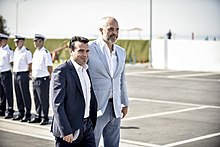Albania–North Macedonia relations
 | |
Albania |
North Macedonia |
|---|---|
Albania–North Macedonia relations are diplomatic relations between the
History
Albanians in North Macedonia are of interest to Albania.[2] In the 1990s, issues revolving around the Albanian community fueled concerns in Albania of destabilisation in the new Macedonian state and possible Serbian intervention.[2] Albania, through President Sali Berisha became one of the early states to recognise Macedonia in April 1993.[2] The country was recognised by Albania under the United Nations (UN) provisional reference of the "former Yugoslav Republic of Macedonia",[3][4] abbreviated as FYROM.[5][6]
Berisha viewed the existence of an independent Macedonia as important to Albanian interests in keeping apart
Separatist sentiments among Albanians in Macedonia were dissuaded by Albania in the aim of further stabilising Macedonia.[2] Berisha attempted through limited influence to encourage the Albanian minority to engage with the Macedonian political system and to place their efforts toward stabilising the country.[2] During the early years of the Macedonia naming dispute, Macedonia was under economic embargo by Greece.[2] Greece suggested the name "Slavomacedonia" as a solution and Berisha, alongside other Albanians in the wider region strongly opposed Macedonia adopting that name.[7] Albania gave its support to Macedonia through offering its transport and port infrastructure for use.[2] Unlike Berisha, the stances of the political opposition Socialist Party and Democratic Alliance closely resembled the Greek position on the Macedonian naming dispute.[2] They both criticised the policy platform of the Albanian government toward Macedonia as "tolerant and often irresponsible".[2] Issues over the position and handling of the Albanian community in the Macedonian state continued to hamper the ability of both countries leadership to create good relations.[2]
In mid June 1993, a border incident occurred.
A summit between President Berisha and Macedonian President Kiro Gligorov was held in May 1994 over infrastructure cooperation, minority issues and bolstering bilateral relations.[2] Macedonian leadership positively viewed the summit and there were initial moves to enhance relations.[2] Later, some statements by Macedonian officials indicated that the country would not undertake major changes toward the Albanian minority in order to improve ties with Albania.[2] In Macedonia, officials were of the view that Albania was in a weak position, due to tensions in its relations with Greece and Serbia.[2] Macedonia's admission into European organisations and a lessening of tensions in the name dispute with Greece gave it minimal incentive to seek closer relations with Albania.[2]
In February 1995, an attempt was made to open an Albanian university in Macedonia and the move was halted by police.[2] Albania officially declared that the university situation may incline it to "reconsider" policy regarding its neighbour.[2] There was pressure directed to the government of Albania by internal political forces to react strongly, however, though displeased with events its response was restrained.[2] Toward late 1996, internal political issues restricted Albania and Macedonia from making attempts to further develop bilateral relations.[2]

After an earthquake struck Albania (26 November 2019), North Macedonia sent €100,000 in financial aid,[9] as well as drones with thermal cameras to search for survivors under the rubble. Rescue teams were also sent, as well as mechanical equipment to clear the rubble.[10][11]
In December 2023 at the National History Museum in Tirana, Albanian officials returned 20 stolen cultural icons to North Macedonia that had been taken about 10 years previous, representing years of international cooperation against trafficking of art objects.[12]
See also
- Foreign relations of Albania
- Foreign relations of North Macedonia
- Accession of Albania to the European Union
- Accession of North Macedonia to the European Union
- Albania–NATO relations
- North Macedonia–NATO relations
- Albanians in North Macedonia
- Macedonians in Albania
- Albania–Yugoslavia relations
References
- ^ "Macedonia's Albanian-Language Bill Becomes Law". Radio Free Europe/Radio Liberty. 15 January 2019.
- ^ ISBN 9780429982040.
- ^ United Nations, A/RES/47/225, April 8, 1993
- ^ United Nations Security Council Resolutions 817 of April 7 and 845 June 18, 1993, see UN resolutions made on 1993
- ^ "Diplomatic Representative of Albania, 30, FYROM". Archived from the original on March 4, 2016. Retrieved February 29, 2012.
Ministry of Foreign Affairs of the Republic of Albania
- ^ FYROM on un.org
- ISBN 9781850652380.
- ^ ISBN 9780300102680.
- ^ "Maqedonia e Veriut jep 100 mijë Euro për Shqipërinë" (in Albanian). TV Klan. 28 November 2019. Retrieved 29 November 2019.
- ^ "Земјотрес во Албанија - Македонија прати помош [Earthquake in Albania, Macedonia sends help]" (in Macedonian). Gevgelijanet. 26 November 2019. Archived from the original on 22 January 2020. Retrieved 30 November 2019.
- ^ "Albania hit by a devastating earthquake, North Macedonia to send rescue teams". Nezavisen Vesnik. 26 November 2019. Retrieved 30 November 2019.
- ^ Semini, Llazar (15 December 2023). "Albania returns 20 stolen icons to neighboring North Macedonia". AP News. Associated Press. Retrieved 16 December 2023.


